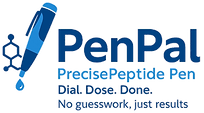This is a 20mg dosage (10mg of BPC-157 and 10mg of TB-500).
Peptides commonly studied for their potential in promoting tissue repair and healing. Both have distinct yet complementary mechanisms that, when combined, may offer synergistic benefits. BPC-157, a stable gastric pentadecapeptide, is derived from a protective protein found in the stomach lining. It has been shown in preclinical studies to accelerate healing of muscles, tendons, and ligaments by promoting angiogenesis (the formation of new blood vessels) and regulating the production of growth factors. Similarly, TB-500, a fragment of the naturally occurring Thymosin Beta-4 protein, plays a key role in cell migration, tissue regeneration, and reducing inflammation.
The potential synergy between these peptides arises from their overlapping yet distinct pathways in tissue repair. While BPC-157 excels at improving blood flow and reducing inflammation, TB-500 focuses on facilitating cellular migration to the injury site and supporting the repair process at the cellular level. Together, they may accelerate healing by addressing multiple aspects of tissue recovery, particularly in sports injuries or chronic conditions where regeneration is compromised. BPC-157 and TB-500 are synthetic peptides studied primarily in animal models for their potential regenerative and healing properties. While they show promise, human data is limited, and they are not approved by the FDA for clinical use. Below is a summary of their potential benefits based on available research and anecdotal reports, with emphasis on the need for caution and further study.
BPC-157 (Body Protection Compound-157)
BPC-157 is a 15-amino-acid peptide derived from a protein found in human gastric juice. It is noted for its regenerative effects across various tissues.
Potential Benefits of BPC-157
- Tissue Repair and Healing:
- Musculoskeletal Injuries: Preclinical studies suggest BPC-157 promotes healing of muscles, tendons, ligaments, and bones by enhancing fibroblast activity, collagen synthesis, and angiogenesis (new blood vessel formation). It may accelerate recovery from injuries like tendonitis, muscle strains, and ligament tears.
- Gastrointestinal Health: BPC-157 is particularly effective in animal models for healing gastrointestinal issues, such as ulcers, fistulas (e.g., in Crohn’s disease), and inflammatory bowel disease, potentially reducing healing time significantly (e.g., fistulas from years to weeks).
- Nerve and Brain Repair: Some studies indicate potential neuroprotective effects, aiding repair of nerve and brain tissue damage.
- Anti-Inflammatory Effects:
- BPC-157 may reduce inflammation, particularly in musculoskeletal and gastrointestinal tissues, by modulating inflammatory pathways and counteracting effects of NSAIDs or corticosteroids.
- Improved Blood Flow:
- It enhances angiogenesis by increasing vascular endothelial growth factor receptor (VEGFR2) expression, improving blood flow to injury sites, which supports faster healing.
- 4. Growth Hormone Receptor Expression:
- BPC-157 upregulates growth hormone receptor expression in tendon fibroblasts, potentially enhancing cell proliferation and tissue regeneration.
- 5. Pain Reduction:
- Animal studies suggest BPC-157 may reduce inflammatory pain, with effects comparable to aspirin or morphine in some models.
- 6. Other Potential Benefits:
- Anecdotal reports claim benefits for joint health, muscle strength, and even cognitive performance,




